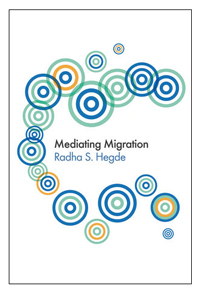Mediating Migration
240 pages
January 2016, Polity
ISBN: 978-0-7456-4633-6
.
Media practices and the everyday cultures of transnational migrants are deeply interconnected. Mediating Migration narrates aspects of the migrant experience as shaped by the technologies of communication and the social, political and cultural configurations of neoliberal globalization. The book examines the mediated reinventions of transnational diasporic cultures, the emergence of new publics, and the manner in which nations and migrants connect. By placing migration and media practices in the same frame, the book offers a wide-ranging discussion of the contested politics of mobility and transnational cultures of diasporic communities as they are imagined, connected, and reproduced by various groups, individuals, and institutions. Drawing on current events, activism, cultural practices, and crises concerning immigration, this book is organized around themes legitimacy, recognition, publics, domesticity, authenticity that speak to the entangled interconnections between media and migration.
Mediating Migration will be of interest to students in media, communication, and cultural studies. The book raises questions that cut across disciplines about cutting-edge issues of our times migration, mobility, citizenship, and mediated environments.
.
Table of Contents
Contents
Acknowledgments
1. Introduction
2. Legitimacy: Accumulating Status
3. Recognition: Politics and Technologies
4. Publics: Eyeing Gender
5. Domesticity: Digital Visions and Versions
6. Authenticity: Pursuits of Auras
7. Conclusion: Destinations and Beginnings
Notes
References
Index
.
Reviews
“Mediating Migration takes a complicated and difficult subject and offers an original and sophisticated interrogation of the ways contemporary media, in all its dimensions, represents, constructs, and interrogates the experiences of and responses to migration.”
— Lawrence Grossberg, University of North Carolina
“In this marvelous and insightful book, Radha Hegde unpacks and then reassembles the relationship between globalization, media, and migration. While many have noted that these key concepts cannot be understood in isolation from each other, in this book we get inside the materiality of the migrant condition as it is constituted by the interplay of global forces and mediated networks. We learn not only how the media shapes popular understanding and policies on migration, but also how migrants produce new mediascapes.”
— Nikos Papastergiadis, The University of Melbourne
